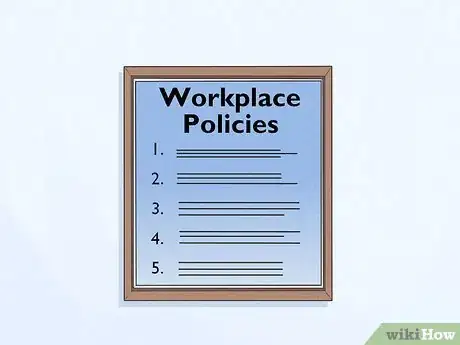This article was co-authored by Chloe Carmichael, PhD and by wikiHow staff writer, Hannah Madden. Chloe Carmichael, PhD is a Licensed Clinical Psychologist who runs a private practice in New York City. With over a decade of psychological consulting experience, Dr. Chloe specializes in relationship issues, stress management, self esteem, and career coaching. She has also instructed undergraduate courses at Long Island University and has served as adjunct faculty at the City University of New York. Dr. Chloe completed her PhD in Clinical Psychology at Long Island University in Brooklyn, New York and her clinical training at Lenox Hill Hospital and Kings County Hospital. She is accredited by the American Psychological Association and is the author of “Nervous Energy: Harness the Power of Your Anxiety” and “Dr. Chloe's 10 Commandments of Dating.”
There are 7 references cited in this article, which can be found at the bottom of the page.
This article has been viewed 20,699 times.
Getting mistreated for your beliefs is very discouraging, especially if it happens on multiple occasions. You might feel hopeless, lost, or lonely, and it can be frustrating to deal with harassment time and time again. Try to surround yourself with friends and family who will support you during this tough time, and escalate your mistreatment to an authority figure if it keeps getting worse. Remember to care for your mental health as you deal with this situation, as it can be very emotionally taxing.
Steps
Handling it on Your Own
-
1Stand up for yourself if you can do so safely. If you find yourself being mistreated, try being assertive with your words or actions to let the person know that it’s not okay. You don’t have to be rude or aggressive, but you can get your point across so they know their behavior is unacceptable.[1]
- You could say something like, “The way you’re speaking to me right now is very condescending, and I’d really rather you stopped.”
- Try not to insult the person or make them angry, as this could make the mistreatment worse.
- If you don’t feel safe, try to get away from the person as fast as possible and then tell an authority figure.
-
2Express your feelings to people who are accidentally mistreating you.[2] If they don't seem to realize that they're upsetting you, you can express your feelings with "I" phrasing. Using the format "When you _____, I feel _____" can help you express how you feel in a clear, non-blaming way.[3]
- For example, “When you insult my religion, I feel like you don’t support me as a friend or coworker.”
- People who are intentionally upsetting you are not going to stop just because you say you're upset, but if they didn't mean to hurt you, they will hopefully change their behavior.
Advertisement -
3Limit your contact with people who mistreat you, if you can. If all else fails, avoiding the person or people who aren’t treating you well will limit your exposure to their abuse. If you go to school or work with them, try to avoid them in the halls or during meetings. If they’re a friend, stop hanging out with them as much.[4]
- You can also block their number and block them online if they’re reaching out to you that way.
- While you can try to avoid the person as much as you can, you shouldn’t have to change your whole schedule just to get away from them. If it gets bad enough where you have to consciously make an effort not to see them, escalate the situation to an authority figure.
-
4Plan how you’ll react ahead of time if you deal with this repeatedly. It can be tough to think of something good to say in the moment when you’re feeling flustered or afraid. Try to think about a potential way you could de-escalate the situation in case it happens again.[5]
- For example, if someone is making fun of you, you could say, “You already said all this last week. Why do you need to keep repeating yourself?”
- Or, “We’ve all heard how you feel about the matter, so maybe you could move on now.”[6]
Asking for Help
-
1Tell someone you trust about what’s going on. It’s always nice to have people on your side, especially if you’re being mistreated. If you feel comfortable doing so, let your friends know what you’ve been dealing with so they can stand up for you and check in on you every now and then.[7]
- Your friends can help you navigate difficult situations when you are being mistreated by standing up for you.
- Try saying something like, “I’m not sure if you’ve noticed, but this person at school keeps making fun of me. Would you be able to hang out with me before class so I have someone nearby?”
-
2Document all the abuse that is happening. Unfortunately, when you take a mistreatment case to an authority figure, it can be hard to prove your word against another person’s. Try to write down everything that the person does to you in a notebook as soon as you can so you have a record of what’s been going on and for how long.[8]
- You could also ask your friends or coworkers to come forward with you if they’ve witnessed your mistreatment.
-
3Look into your school or workplace policies on harassment. If you don’t feel like you can handle the mistreatment on your own, you can escalate the situation to the higher-ups of your establishment. Most workplaces have a Human Resources, or HR department, where you can report mistreatment. Schools may have a department or staff member in charge of dealing with bullying or hate speech.[9]
- You can find this out by looking through your school or workplace’s code of conduct.
-
4Speak to an authority figure if the mistreatment continues. If you’re being mistreated at work or school, talk to your boss or your teacher about what’s going on. They can help you decide your next course of action and take a stance against the person.[10]
- It can be difficult to find the courage to bring your problem to another person. Just remember that it’s okay to ask for help.
- Say something like, “I’ve been getting mistreated by my coworker for a few months now. I’ve asked them to change their behavior repeatedly and they won’t stop. Could you step in and help me out?”
-
5Report your harassment to the authorities if your institution won’t help. If your school or work administration can’t/won’t help you out, you can escalate your situation all the way to your governmental authorities. You can report your workplace for harassment and a failure to defend your beliefs; however, this may cause you to be targeted more, since your boss / coworkers / peers may get in trouble.[11]
- To find out where to report your harassment, search “report harassment + your country.”
Caring for Your Mental Health
-
1Focus on your strengths. When someone constantly tells you that you’re no good, it can be hard not to believe them. Remind yourself that you are a strong, confident person no matter what anyone says. Try writing down 5 things that you do super well at school, in the workplace, or at home.[12]
- For example, you might write, “I’m really good at bicycling, time-management, cooking pasta, singing, and calligraphy.”
-
2Connect with a support system. Support systems look different for everyone, and yours can include whoever you want it to. Try to surround yourself with family and friends who will support you no matter what. This will help you feel a little less alone so you can move forward with your head held high.[13]
- You can call your friend once a week, have a family dinner once a month, or even video chat with people every few days.
-
3Spend time with people who share the same beliefs as you. Spend more time at the mosque, get together with your vegetarian friends, or attend a pro-choice event. This can help you remember why your beliefs are important to you, and remind you that it's okay to believe in what you feel is important.[14]
- This is slightly different from a support network, but it is helpful to surround yourself with people who share your beliefs as well.
-
4Talk to a mental health professional. It's hard to be mistreated, and there are emotional costs. If you are having a hard time coping, look for a counselor who can help you through it and reassure you that your mistreatment is not your fault.[15]
- If you are currently in school, you may be able to access free health care on campus.
Expert Q&A
Did you know you can get expert answers for this article?
Unlock expert answers by supporting wikiHow
-
QuestionWhat should I do if someone I love keeps hurting me?
 Chloe Carmichael, PhDChloe Carmichael, PhD is a Licensed Clinical Psychologist who runs a private practice in New York City. With over a decade of psychological consulting experience, Dr. Chloe specializes in relationship issues, stress management, self esteem, and career coaching. She has also instructed undergraduate courses at Long Island University and has served as adjunct faculty at the City University of New York. Dr. Chloe completed her PhD in Clinical Psychology at Long Island University in Brooklyn, New York and her clinical training at Lenox Hill Hospital and Kings County Hospital. She is accredited by the American Psychological Association and is the author of “Nervous Energy: Harness the Power of Your Anxiety” and “Dr. Chloe's 10 Commandments of Dating.”
Chloe Carmichael, PhDChloe Carmichael, PhD is a Licensed Clinical Psychologist who runs a private practice in New York City. With over a decade of psychological consulting experience, Dr. Chloe specializes in relationship issues, stress management, self esteem, and career coaching. She has also instructed undergraduate courses at Long Island University and has served as adjunct faculty at the City University of New York. Dr. Chloe completed her PhD in Clinical Psychology at Long Island University in Brooklyn, New York and her clinical training at Lenox Hill Hospital and Kings County Hospital. She is accredited by the American Psychological Association and is the author of “Nervous Energy: Harness the Power of Your Anxiety” and “Dr. Chloe's 10 Commandments of Dating.”
Licensed Clinical Psychologist
Warnings
- Try not to make the person who is mistreating you angry. This can only escalate the situation, and it may be counterproductive.⧼thumbs_response⧽
References
- ↑ https://www.childline.org.uk/info-advice/bullying-abuse-safety/types-bullying/faith-religious-bullying/
- ↑ Camber Hill. Life Coach. Expert Interview. 29 May 2019.
- ↑ https://www.psychologytoday.com/us/blog/emotional-fitness/201207/the-best-ways-deal-people-who-hurt-you
- ↑ https://www.childline.org.uk/info-advice/bullying-abuse-safety/types-bullying/faith-religious-bullying/
- ↑ https://www.apa.org/topics/discrimination
- ↑ Camber Hill. Life Coach. Expert Interview. 29 May 2019.
- ↑ https://www.childline.org.uk/info-advice/bullying-abuse-safety/types-bullying/faith-religious-bullying/
- ↑ https://www.citizensadvice.org.uk/law-and-courts/discrimination/discrimination-because-of-race-religion-or-belief/discrimination-because-of-religion-or-belief/
- ↑ https://www.citizensadvice.org.uk/law-and-courts/discrimination/discrimination-because-of-race-religion-or-belief/discrimination-because-of-religion-or-belief/
- ↑ https://www.equalityhumanrights.com/en/advice-and-guidance/religion-or-belief-discrimination
- ↑ https://www.eeoc.gov/laws/guidance/questions-and-answers-religious-discrimination-workplace
- ↑ https://www.childline.org.uk/info-advice/bullying-abuse-safety/types-bullying/faith-religious-bullying/
- ↑ https://www.apa.org/topics/discrimination
- ↑ https://www.apa.org/topics/discrimination
- ↑ https://www.apa.org/topics/discrimination









































































